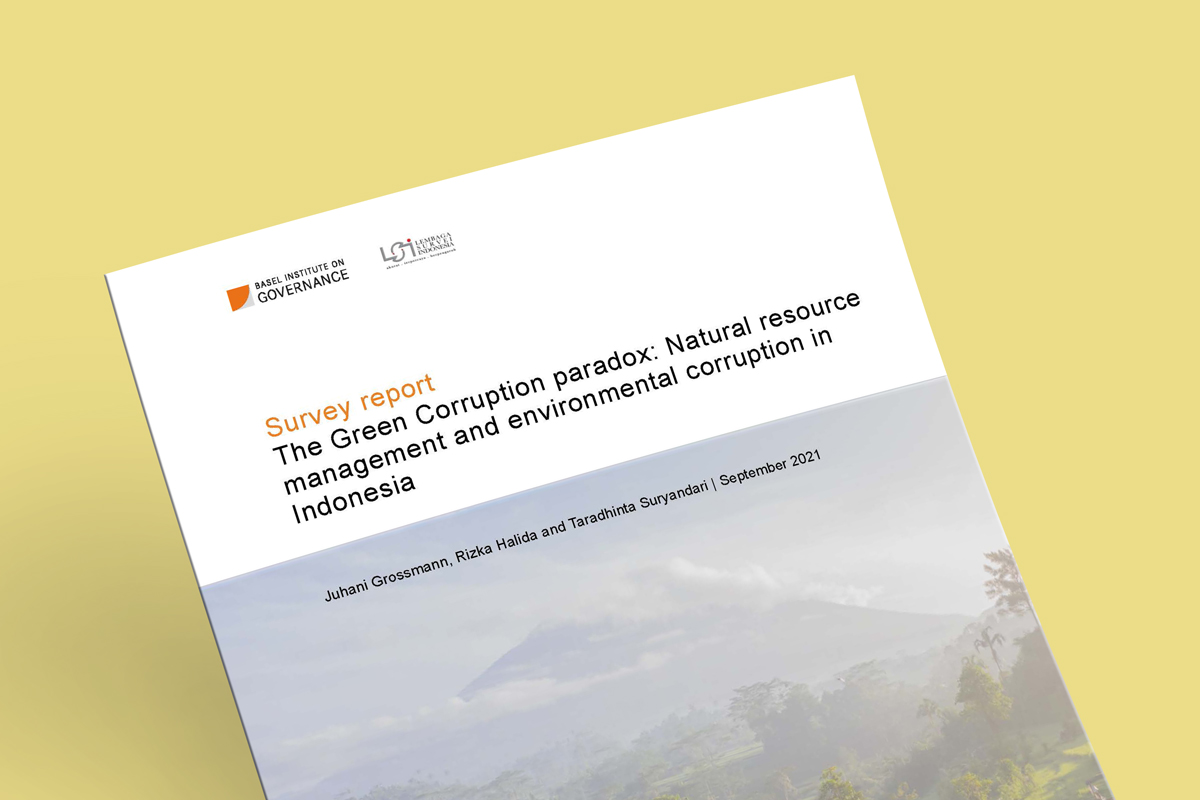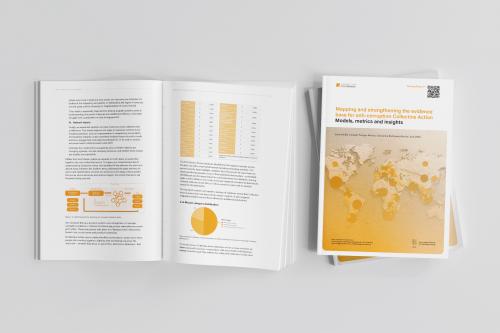The Green Corruption paradox: how Indonesians view corruption, the environment and economic development

Emerging economies have long struggled with the question of how to combine economic development with sustainable use of natural resources. How does corruption factor into this combination?
Our recent survey of Indonesians’ attitudes to corruption, environmental degradation and the economy reveals what we call the Green Corruption paradox: Conflicting, and arguably mutually exclusive, views on all three topics can co-exist. Despite seeing the presence of and being deeply concerned about corruption and environmental degradation, people tend to focus on livelihoods when times are hard.
People also, according to the survey data, favour economic structures that appear to channel the benefits of natural resource utilisation more directly to citizens. In Indonesia, this means rejecting private companies – particularly foreign-owned – in favour of state-owned enterprises (SOEs) and people’s cooperatives.
Given that the governance structures of both remain weak, as evidenced in part by numerous corruption cases involving SOEs, this “trust credit” creates tremendous expectations of SOEs’ future behaviour. This can only be ensured through the systematic mitigation of corruption risks in these vast, crucial and proliferating institutions.
This requires bold leadership that has historically been provided by the Corruption Eradication Commission (KPK). Unfortunately, our survey shows a steady and significant decline of trust in the KPK, losing 20 points (from 90% to 70%) in the last five years, with the lion’s share of the loss occurring since late 2019.
Fears, beliefs and contradictions – what the survey revealed
Together with Lembaga Survei Indonesia (LSI), the leading Indonesian pollster, we ran a national public opinion survey conducted via telephone in July 2021 covering 2,580 respondents. In-depth face-to-face interviews also took place with 30 private-sector representatives working in various natural resource sectors.
According to the survey data, Indonesians harbour great reservations about corruption levels generally. The share of the public that says corruption has increased over the last two years is at its second highest level (60%) in the five years that LSI has been measuring this question. The survey also revealed serious concerns about high levels of corruption in the natural resource sector specifically, and about worsening environmental degradation.
Yet despite this, two thirds of respondents say they believe that some profitable industries based on Indonesia’s rich natural resources, including plantations for palm oil and rubber, are not harmful to the environment.
Moreover, even when environmental degradation is clearly the result of natural resource exploitation, a majority believes that this is acceptable because of the economic benefits that it brings. This attitude may be exacerbated by the depressed economic situation: a full two-thirds of the participants see the current state of the economy as bad or very bad.
Despite this pessimistic assessment of both the economy and overall corruption levels, trust in government remains high. A full three quarters of participants believe the government can be trusted to be a steward of the environment. The same percentage say the government is doing its best to balance economic growth and environmental degradation.
This trust in government, including in agencies in charge of natural resource management, cohabitates uncomfortably with citizens’ assessment of the level of corruption in these sectors. When asked about a wide array of activities to utilise natural resources, respondents who had an opinion were between two and three times more likely to say that corruption is widespread or very widespread. Clearly, citizens are not naïve about the governance risks that natural resource exploitation brings with it.
So, the public generally is concerned about corruption and environmental degradation. People also have strong concerns about worsening corruption in the country overall and high levels of corruption in natural resource exploitation in particular. One would think that these concerns would make natural resource sectors highly unattractive. Yet this is not the case.
Based on our analysis of the survey data, we believe the economic benefits of natural resource exploitation are what lead respondents to suspend their otherwise highly sceptical attitude when it comes to the harmfulness of some environmental practices.
This uncomfortable acceptance of natural resource exploitation is further emphasised when a majority of the respondents say that where environmental degradation occurs, it is outweighed by the economic benefits the exploitation brings.
Resource nationalism is alive and well
Concerns about corruption and the environment, one might suppose, could lead to a welcoming of foreign investors with their environmental, social and governance (ESG)-friendly ratings and compliance systems.
This would be a mistake, however, as according to the survey the Indonesian public is highly critical of any involvement of foreign companies – or even any foreign investment – in the natural resource field. The share of respondents that support curbs on foreign investment in environmental exploitation is between four and seven times higher (depending on the sector) than those who do not desire such curbs. This is despite the significant economic hardship the country is experiencing.
This severe dislike of foreign companies is not because they are perceived as more corrupt or more polluting. Rather, the top three reasons are all variations of resource nationalism: foreign companies don’t have Indonesian interests at heart, Indonesia should not compromise its independence, and the expectation that state revenue will be greater without foreign companies.
Economic benefits of natural resource exploitation should flow to citizens
Who, then, should be managing Indonesia’s natural resources? Clearly not Indonesian companies, as the public is overwhelmingly critical of them too. In no sector do more than 14% of respondents support private companies exploiting natural resources.
The answers, according to respondents, are people’s cooperatives and SOEs. Cooperatives are at least twice as popular as private companies (mining) and up to four times more popular (fishing). A majority of respondents also strongly endorsed SOEs and claimed they can be trusted to manage natural resources for the benefit of the people.
Both preferences appear to rest on the belief that natural resources are a public good that should be used to directly improve people’s economic conditions. Private companies that are profit-driven are not seen as sufficiently concerned about this.
Recommendations
Albeit extensive, this is a single survey at an unusual time in history and we should be wary of drawing strong conclusions. Nevertheless, we believe the results point to some clear takeaways that can inform Indonesian policy and the interventions of donors and civil society organisations concerned with conservation, anti-corruption and sustainable development.
- Rebuild trust in the KPK as Indonesia’s principal anti-corruption institution. Recent legal, administrative and political measures that have undermined trust in the KPK need to be urgently reversed to restore the agency’s moral authority and ability to lead the highly complex fight against environmental corruption.
- Only interventions that address economic, governance and environmental concerns together stand a chance to succeed. The close connection between economic, governance and environmental concerns means that any efforts at conservation must address all three of these points. This heightens the complexity of government reforms and donor programmes in any of these areas. Yet it is essential: working in isolation will only lead to efforts being undermined.
- Foreign investors need to grow thick skin. Resource nationalism is a significant obstacle to both foreign investment in the natural resource sector and foreign-supported and -implemented conservation programmes. Foreign actors in the natural resource field need to ensure their systems are sufficiently robust to withstand certain public and likely political criticism.
- Strengthen SOE governance. The strong preference of the public for SOEs in the management of natural resources places a tremendous responsibility on both the government and the SOEs themselves. Numerous corruption scandals and conflicts of interest are evidence that this public trust is on credit and must still be earned through tough political decisions, inspired reforms, methodical implementation and diligent monitoring.
- Support cooperatives in enhancing their governance. Strengthening the governance systems of cooperatives is likely more diffuse and painstaking than undertaking the same exercise in SOEs. However, it should not be neglected considering the environmental, economic and political importance of sectors in which cooperatives are strongly present, such as fishing.
Learn more
- Download the paper. The report was made possible with the generous support of the American people through the USAID CEGAH programme.
- Find out more about the Basel Institute’s Green Corruption programme.





